We've cooked up a bunch of improvements designed to reduce friction and make the.




Lorem ipsum dolor sit amet, consectetur adipiscing elit, sed do eiusmod tempor incididunt ut labore et dolore magna aliqua. Ut enim ad minim veniam, quis nostrud exercitation ullamco laboris nisi ut aliquip ex ea commodo consequat. Duis aute irure dolor in reprehenderit in voluptate velit esse cillum dolore eu fugiat nulla pariatur.
Block quote
Ordered list
Unordered list
Bold text
Emphasis
Superscript
Subscript
Whisper is an automatic speech recognition (ASR) system that OpenAI developed to transcribe and translate spoken language into written text. You can use it for subtitling videos, translating podcasts, providing real-time captions in meetings, and other audio processing tasks.
Faster Whisper is an optimized implementation of Whisper that significantly enhances the speed and efficiency of audio transcription, making it up to four times faster than the original Whisper model while maintaining similar accuracy levels. It also consumes less memory and is cheaper than the original Whisper due to the performance improvements.
The following table lists examples of Faster Whisper processing audio files faster than Whisper:
Runpod provides a serverless template for Faster Whisper that you can deploy, whose endpoint you can call from your projects to process audio files. OpenAI charges users of Whisper based on the length of the audio file; however, since Runpod only charges based on actual execution time, and Faster Whisper is much more performant than Whisper, Runpod’s solution is also much cheaper.
The following table shows how much cheaper it is to process the audio clips from the previous table using Faster Whisper on Runpod:
Now that we’ve seen how much faster and cheaper Faster Whisper on Runpod is compared to Whisper, let’s deploy an endpoint using Runpod Serverless and try it out.
In this blog post you’ll learn how to:
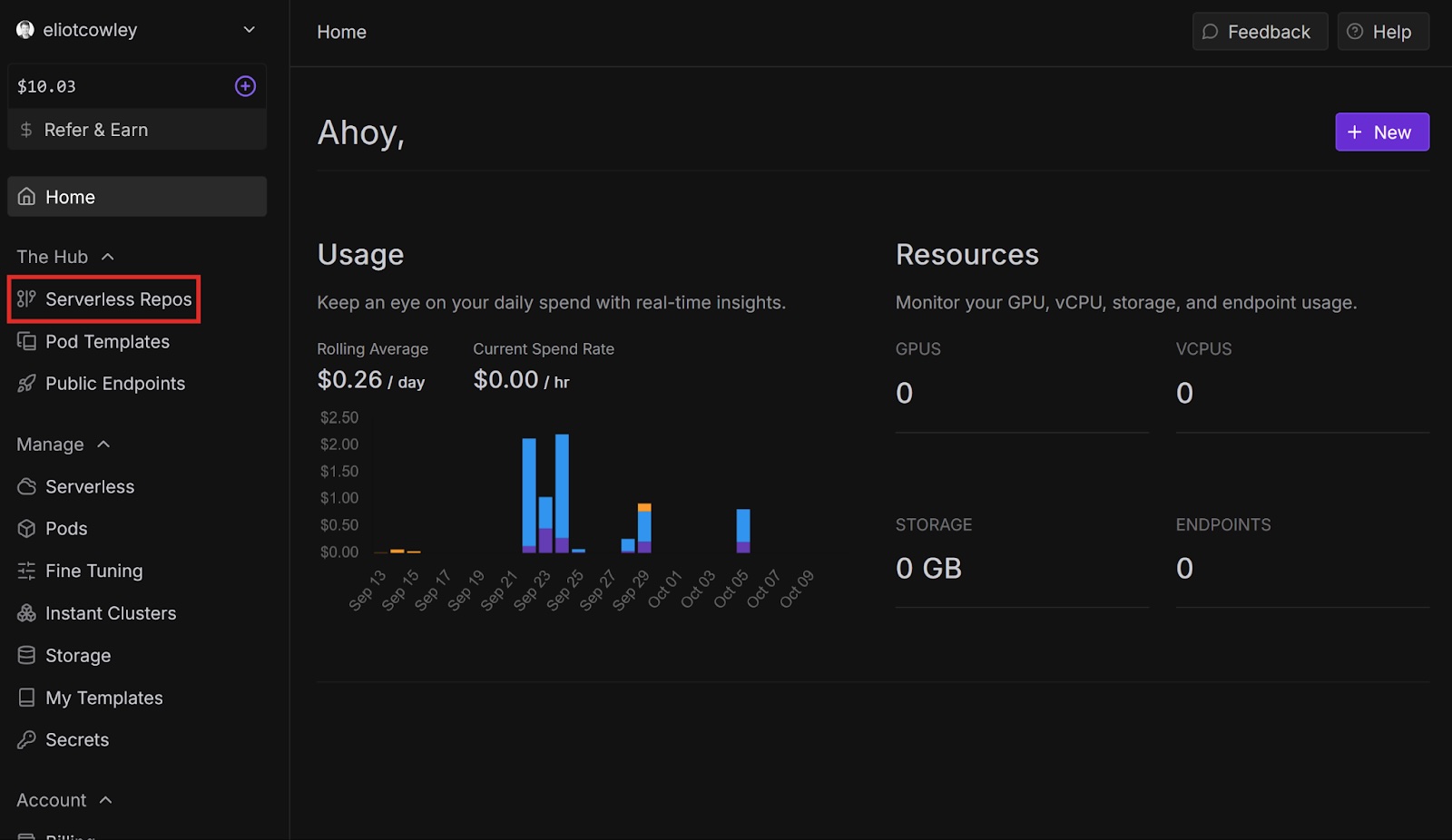
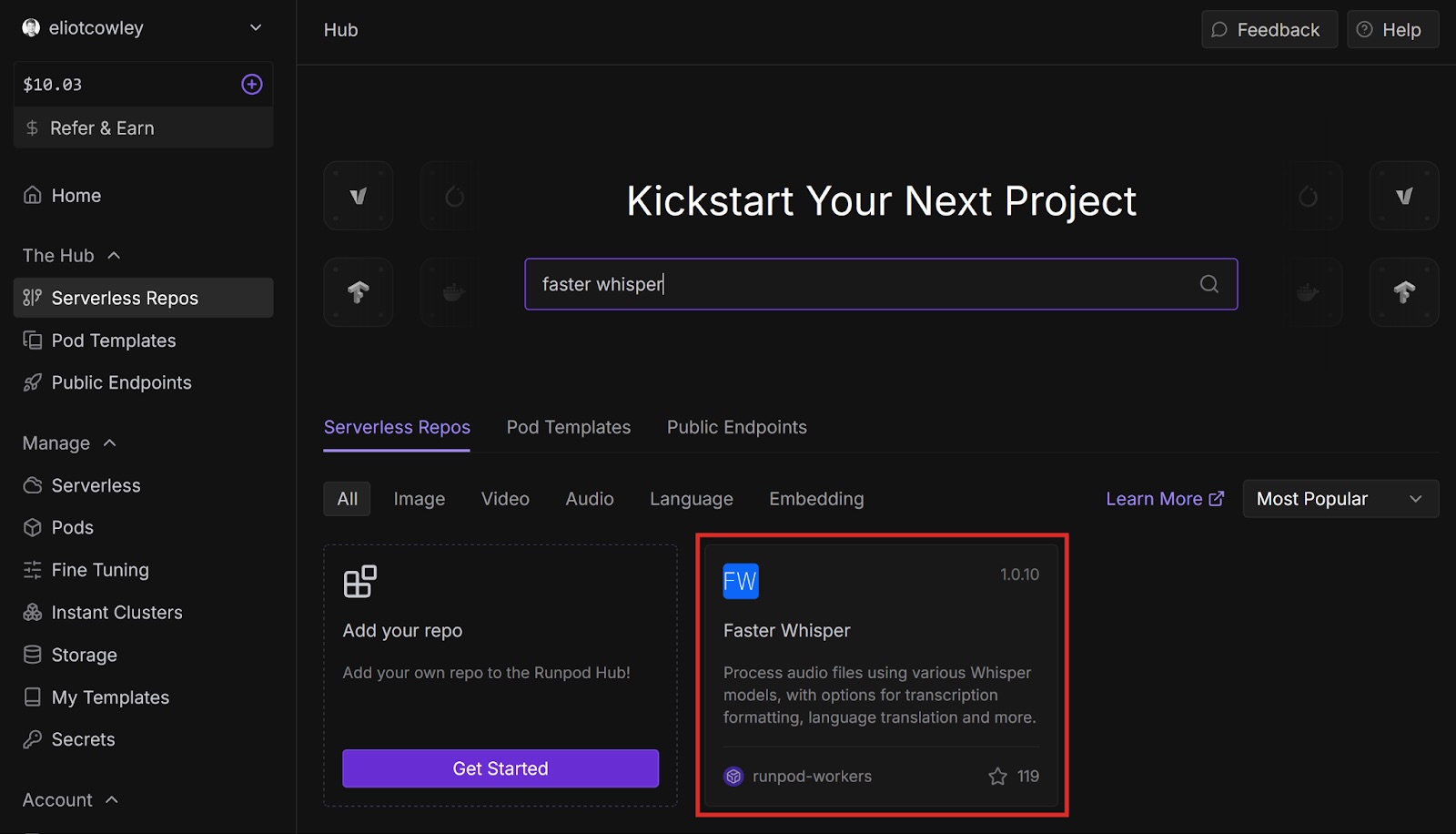
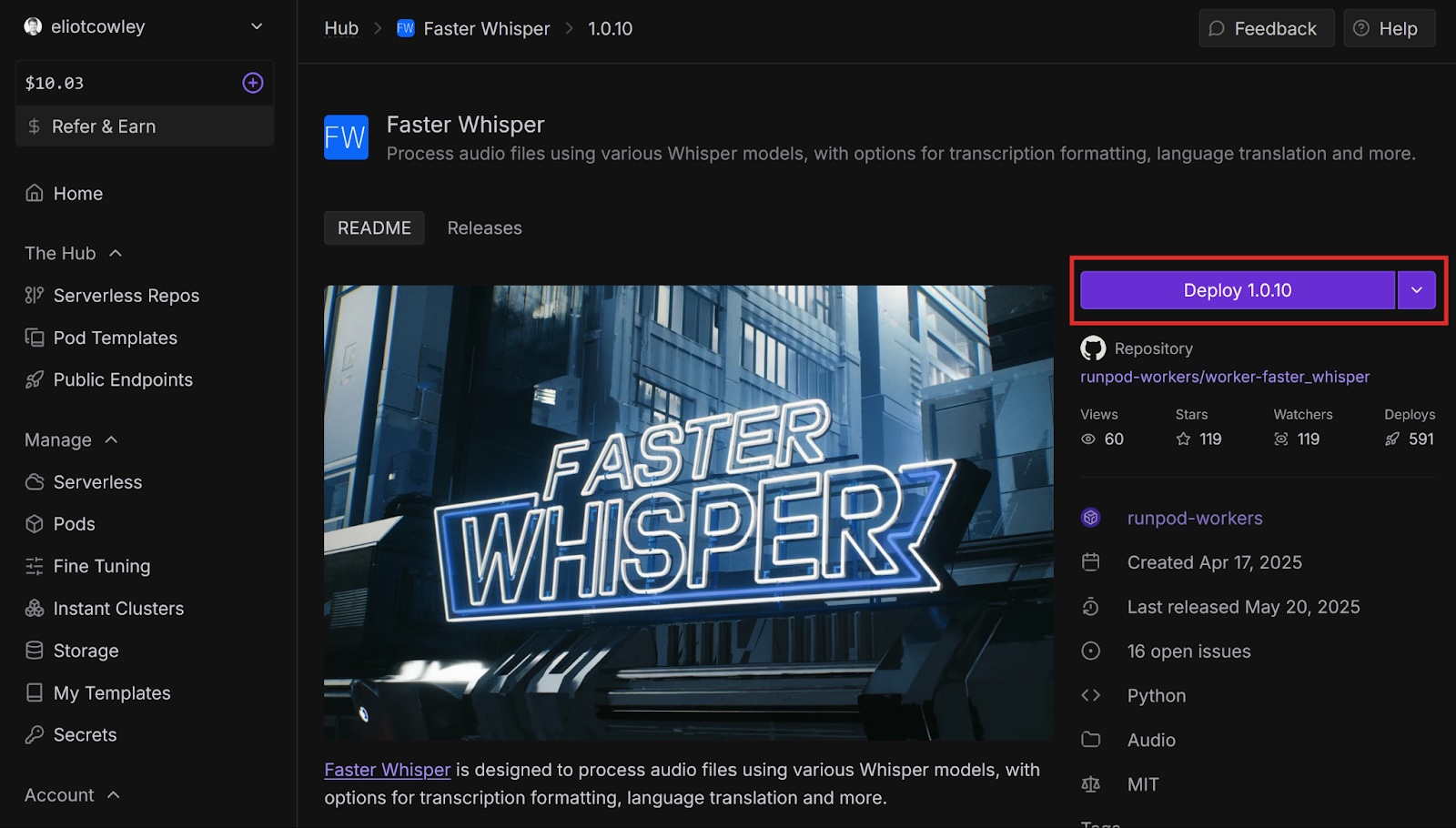
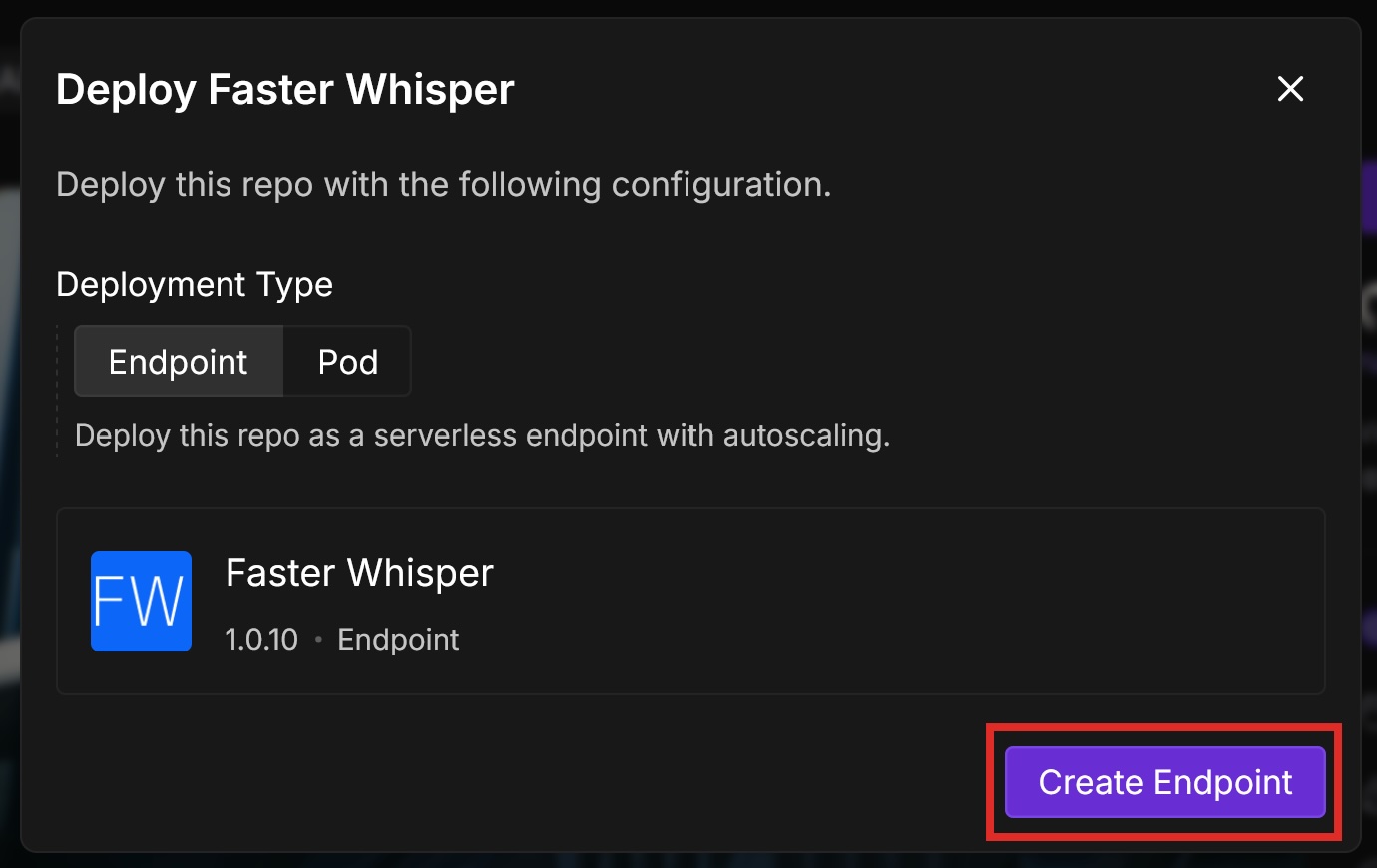

{
"input": {
"audio":
"https://github.com/runpod-workers/sample-inputs/raw/main/audio/gettysburg.wav",
"model": "turbo"
}
}
audiomodel is the Whisper model that will process the audio. turbo is an optimized version of large-v3.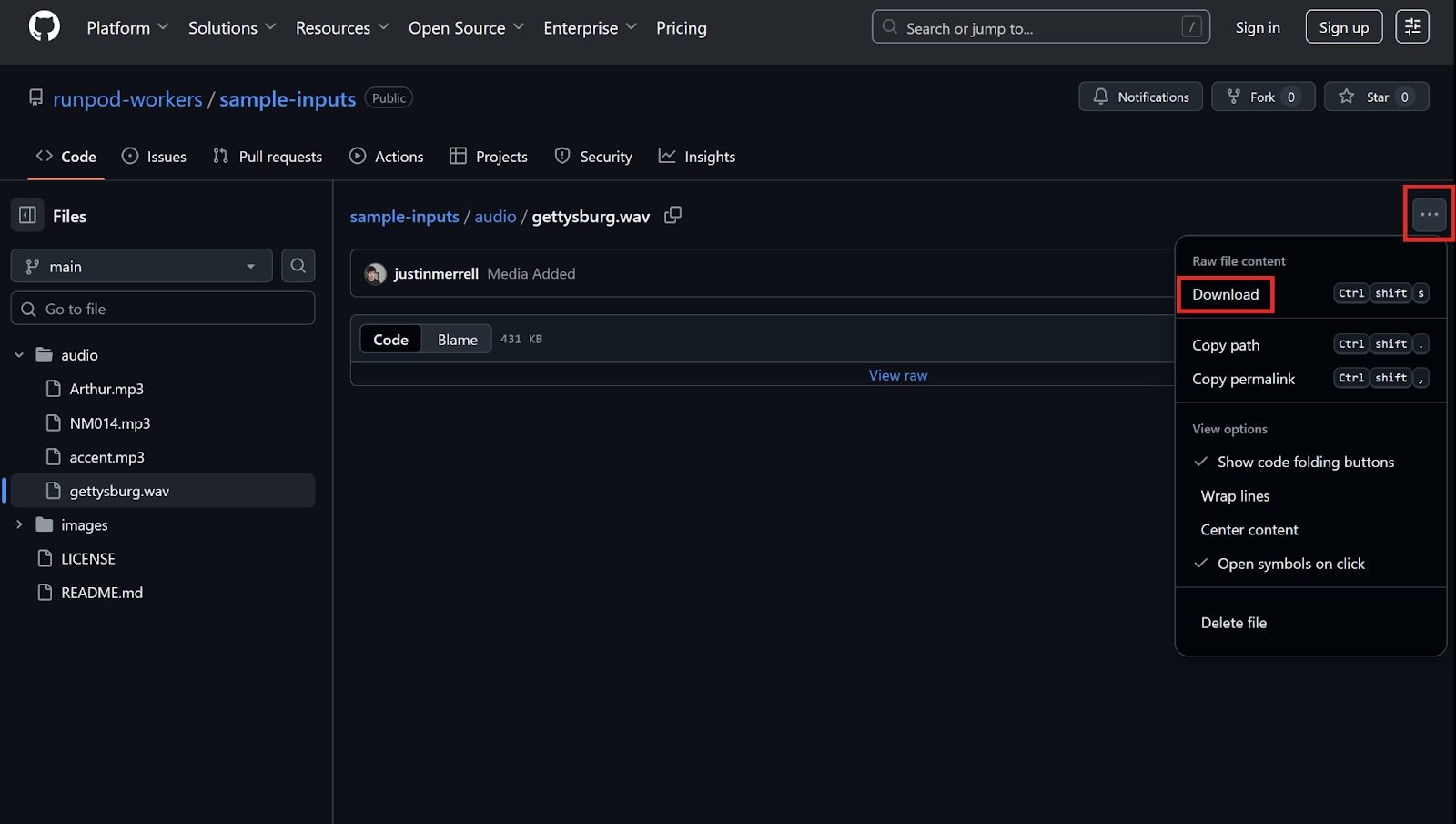

YOUR_API_KEY with your Runpod API key.data variable with the following:data = {
"input": {
"audio": "<AUDIO URL>",
"model": "turbo"
}
}<AUDIO URL> with the GitHub URL of the audio file that you want to process (for example, https://github.com/runpod-workers/sample-inputs/blob/main/audio/gettysburg.wav).print statements to print out the response code and the response body:print(response)
print(response.text)
import requests
headers = {
'Content-Type': 'application/json',
'Authorization': 'Bearer <YOUR API KEY>'
}data = {
"input": {
"audio": "<AUDIO URL>",
"model": "turbo"
}
}
response = requests.post('<YOUR ENDPOINT URL>', headers=headers, json=data)
print(response)
print(response.text)
python <YOUR PYTHON FILENAME>
<Response [200]>
{"delayTime":876,"executionTime":1034,"id":"sync-ed422376-d952-4b83-8365-68831ab24a62-u1","output":{"detected_language":"en","device":"cuda","model":"turbo","segments":[{"avg_logprob":-0.09318462171052631,"compression_ratio":1.3888888888888888,"end":5.22,"id":1,"no_speech_prob":0,"seek":0,"start":0,"temperature":0,"text":" Four score and seven years ago, our fathers brought forth on this continent a new nation,","tokens":[50365,7451,6175,293,3407,924,2057,11,527,23450,3038,5220,322,341,18932,257,777,4790,11,50626]},{"avg_logprob":-0.09318462171052631,"compression_ratio":1.3888888888888888,"end":9.82,"id":2,"no_speech_prob":0,"seek":0,"start":5.68,"temperature":0,"text":" conceived in liberty and dedicated to the proposition that all men are created equal.","tokens":[50649,34898,294,22849,293,8374,281,264,24830,300,439,1706,366,2942,2681,13,50856]}],"transcription":"Four score and seven years ago, our fathers brought forth on this continent a new nation, conceived in liberty and dedicated to the proposition that all men are created equal.","translation":null},"status":"COMPLETED","workerId":"zgxyuf5sijpymo"}"transcription":"Four score and seven years ago, our fathers brought forth on this continent a new nation, conceived in liberty and dedicated to the proposition that all men are created equal."Congratulations! You automatically transcribed an audio file using Faster Whisper and Runpod. Imagine how you could apply this to automate podcast transcriptions, video subtitles, real-time meeting translations - the possibilities are endless.
Now that you’ve transcribed a simple audio file, here are some other things to try next:
tinybasesmallmediumlarge-v1 large-v2 large-v3 distil-large-v2 distil-large-v3 turboTranslate an audio file from a different language to English. You must set the translate field to True. You can also set language to the language code of the audio file, or leave it out to have Faster Whisper detect the language automatically.



Learn how to deploy OpenAI’s Faster Whisper on Runpod Serverless to transcribe and translate audio up to four times faster and at a fraction of the cost of Whisper, using Python for efficient, scalable speech-to-text automation.

Whisper is an automatic speech recognition (ASR) system that OpenAI developed to transcribe and translate spoken language into written text. You can use it for subtitling videos, translating podcasts, providing real-time captions in meetings, and other audio processing tasks.
Faster Whisper is an optimized implementation of Whisper that significantly enhances the speed and efficiency of audio transcription, making it up to four times faster than the original Whisper model while maintaining similar accuracy levels. It also consumes less memory and is cheaper than the original Whisper due to the performance improvements.
The following table lists examples of Faster Whisper processing audio files faster than Whisper:
Runpod provides a serverless template for Faster Whisper that you can deploy, whose endpoint you can call from your projects to process audio files. OpenAI charges users of Whisper based on the length of the audio file; however, since Runpod only charges based on actual execution time, and Faster Whisper is much more performant than Whisper, Runpod’s solution is also much cheaper.
The following table shows how much cheaper it is to process the audio clips from the previous table using Faster Whisper on Runpod:
Now that we’ve seen how much faster and cheaper Faster Whisper on Runpod is compared to Whisper, let’s deploy an endpoint using Runpod Serverless and try it out.
In this blog post you’ll learn how to:





{
"input": {
"audio":
"https://github.com/runpod-workers/sample-inputs/raw/main/audio/gettysburg.wav",
"model": "turbo"
}
}
audiomodel is the Whisper model that will process the audio. turbo is an optimized version of large-v3.

YOUR_API_KEY with your Runpod API key.data variable with the following:data = {
"input": {
"audio": "<AUDIO URL>",
"model": "turbo"
}
}<AUDIO URL> with the GitHub URL of the audio file that you want to process (for example, https://github.com/runpod-workers/sample-inputs/blob/main/audio/gettysburg.wav).print statements to print out the response code and the response body:print(response)
print(response.text)
import requests
headers = {
'Content-Type': 'application/json',
'Authorization': 'Bearer <YOUR API KEY>'
}data = {
"input": {
"audio": "<AUDIO URL>",
"model": "turbo"
}
}
response = requests.post('<YOUR ENDPOINT URL>', headers=headers, json=data)
print(response)
print(response.text)
python <YOUR PYTHON FILENAME>
<Response [200]>
{"delayTime":876,"executionTime":1034,"id":"sync-ed422376-d952-4b83-8365-68831ab24a62-u1","output":{"detected_language":"en","device":"cuda","model":"turbo","segments":[{"avg_logprob":-0.09318462171052631,"compression_ratio":1.3888888888888888,"end":5.22,"id":1,"no_speech_prob":0,"seek":0,"start":0,"temperature":0,"text":" Four score and seven years ago, our fathers brought forth on this continent a new nation,","tokens":[50365,7451,6175,293,3407,924,2057,11,527,23450,3038,5220,322,341,18932,257,777,4790,11,50626]},{"avg_logprob":-0.09318462171052631,"compression_ratio":1.3888888888888888,"end":9.82,"id":2,"no_speech_prob":0,"seek":0,"start":5.68,"temperature":0,"text":" conceived in liberty and dedicated to the proposition that all men are created equal.","tokens":[50649,34898,294,22849,293,8374,281,264,24830,300,439,1706,366,2942,2681,13,50856]}],"transcription":"Four score and seven years ago, our fathers brought forth on this continent a new nation, conceived in liberty and dedicated to the proposition that all men are created equal.","translation":null},"status":"COMPLETED","workerId":"zgxyuf5sijpymo"}"transcription":"Four score and seven years ago, our fathers brought forth on this continent a new nation, conceived in liberty and dedicated to the proposition that all men are created equal."Congratulations! You automatically transcribed an audio file using Faster Whisper and Runpod. Imagine how you could apply this to automate podcast transcriptions, video subtitles, real-time meeting translations - the possibilities are endless.
Now that you’ve transcribed a simple audio file, here are some other things to try next:
tinybasesmallmediumlarge-v1 large-v2 large-v3 distil-large-v2 distil-large-v3 turboTranslate an audio file from a different language to English. You must set the translate field to True. You can also set language to the language code of the audio file, or leave it out to have Faster Whisper detect the language automatically.
The most cost-effective platform for building, training, and scaling machine learning models—ready when you are.
